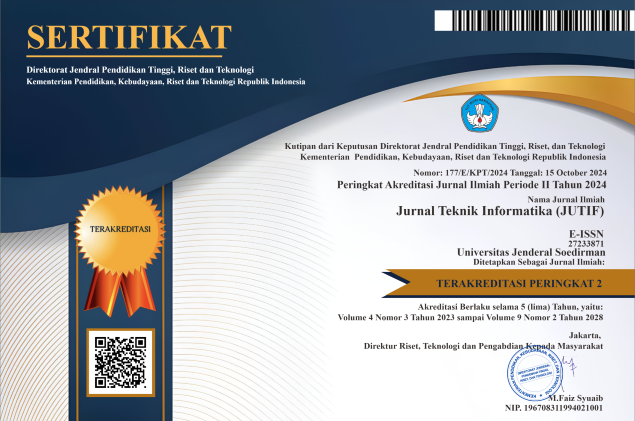K-ALLY BASED DYNAMIC FUZZY CLUSTERING FOR GEOPOLITICAL ALLIANCE ANALYSIS: A CASE STUDY INSPIRED BY THE RUSSIAN-UKRAINIAN CONFLICT
DOI:
https://doi.org/10.52436/1.jutif.2025.6.1.907Keywords:
Dynamic Fuzzy Clustering, K-Ally Algorithm, Geopolitical Alliance Analysis, Russia-Ukraine Conflict, Fuzzy Logic in GeopoliticsAbstract
Geopolitical alliances are often based on a combination of factors such as geographic proximity, military strength, and strategic interests. In this research, we introduce the K-Ally algorithm based on Dynamic Fuzzy Clustering to dynamically analyze alliance patterns between countries. Using fuzzy logic and adaptive thresholds, this algorithm evaluates the potential benefits of alliances based on key attributes, such as geographic distance and power differences. This study is inspired by the allied dynamics that emerged in the Russian-Ukrainian war, where changes in strategy and international relations were key to the continuation of the conflict. The paper also compare this algorithm with the K-Means method commonly used in geopolitical data analysis. Experimental results show that K-Ally based on Dynamic Fuzzy Clustering is able to capture alliance dynamics better than K-Means, especially in conditions of uncertainty or attribute imbalance between countries. This research contributes to the development of new analytical tools for the study of geopolitics and international conflict.
Downloads
References
Y. Ding, “THE IMPLICATIONS OF RUSSIA-UKRAINE CONFLICT FOR GEO-ECONOMICS DEVELOPMENT,” Econ. Probl. Leg. Pract., 2022, [Online]. Available: https://api.semanticscholar.org/CorpusID:252659163
P. Y. Smirnov, “The Accession of Finland and Sweden to NATO: Geopolitical implications for Russia’s position in the Baltic Sea region,” Balt. Reg., 2023, [Online]. Available: https://api.semanticscholar.org/CorpusID:266681917
J. Chen, J. Zhu, H. Jiang, H. Yang, and F. Nie, “Sparsity Fuzzy C-Means Clustering With Principal Component Analysis Embedding,” IEEE Trans. Fuzzy Syst., vol. 31, pp. 2099–2111, 2023.
J. H. Das, “From neutrality to NATO: Analyzing the role of the Russia-Ukraine war in Finland’s economy and subsequent path towards NATO membership,” Int. J. Sci. Res. Arch., 2024, [Online]. Available: https://api.semanticscholar.org/CorpusID:267518607
K. Rohulia, “ISRAEL’S POLICY IN THE CONTEXT OF RUSSIA’S WAR AGAINST UKRAINE: A YEAR OF NEUTRAL AID,” Bull. Taras Shevchenko Natl. Univ. Kyiv Int. Relat., 2023, [Online]. Available: https://api.semanticscholar.org/CorpusID:270211328
C. Cheng, C. Peng, and T. Zhang, “Fuzzy K-Means Cluster Based Generalized Predictive Control of Ultra Supercritical Power Plant,” IEEE Trans. Ind. Inform., vol. 17, pp. 4575–4583, Jul. 2021, doi: 10.1109/TII.2020.3020259.
M. V. Kusuma and S. Juanita, “COMPARISON OF K-NEAREST NEIGHBORS AND NAÏVE BAYES CLASSIFIER ALGORITHMS IN SENTIMENT ANALYSIS OF USER REVIEWS FOR INTERMITTENT FASTING APPLICATIONS,” J. Tek. Inform. Jutif Unsoed, vol. 5.
F. Nie, X. Zhao, R. Wang, X. Li, and Z. Li, “Fuzzy K-Means Clustering With Discriminative Embedding,” IEEE Trans. Knowl. Data Eng., vol. 34, pp. 1221–1230, Mar. 2022, doi: 10.1109/tkde.2020.2995748.
X. Zhao, F. Nie, R. Wang, and X. Li, “Robust Fuzzy K-Means Clustering With Shrunk Patterns Learning,” IEEE Trans. Knowl. Data Eng., vol. 35, pp. 3001–3013, Sep. 2021, doi: 10.1109/TKDE.2021.3116257.
M. Madbouly, S. Darwish, N. Bagi, and M. Osman, “Clustering Big Data Based on Distributed Fuzzy K-Medoids: An Application to Geospatial Informatics,” IEEE Access, vol. 10, pp. 20926–20936, 2022, doi: 10.1109/ACCESS.2022.3149548.
C. Liu et al., “A Moving Shape-based Robust Fuzzy K-modes Clustering Algorithm for Electricity Profiles,” Electr. Power Syst. Res., vol. 187, p. 106425, Oct. 2020, doi: 10.1016/j.epsr.2020.106425.
T. Zhang, Fumin, D. Yue, C. Peng, and G. O’hare, “Interval Type-2 Fuzzy Local Enhancement Based Rough K-Means Clustering Considering Imbalanced Clusters,” IEEE Trans. Fuzzy Syst., vol. 28, pp. 1925–1939, Sep. 2020, doi: 10.1109/TFUZZ.2019.2924402.
Q. Dai, S. Luo, Y. Tian, and Y. Wang, “The Impact of NATO in the Current International Political Landscape in the Russia-Ukraine War,” J. Educ. Humanit. Soc. Sci., Apr. 2024, doi: 10.54097/tkpxwj62.
G. Mujadid and S. Kiran, “Russian-Ukraine Conflict and the Purpose of NATO: A Rethink,” J. Res. Soc. Sci., Jan. 2024, doi: 10.52015/jrss.12i1.239.
O. Demenko, “The evolution of NATO policy in the conditions of the russian-Ukrainian war,” Dipl. Ukr., 2023, doi: 10.37837/2707-7683-2023-5.
J. Magula, M. Rouland, and P. Zwack, “NATO and Russia: defense and deterrence in a time of conflict,” Def. Stud., vol. 22, pp. 502–509, Jun. 2022, doi: 10.1080/14702436.2022.2082957.


























